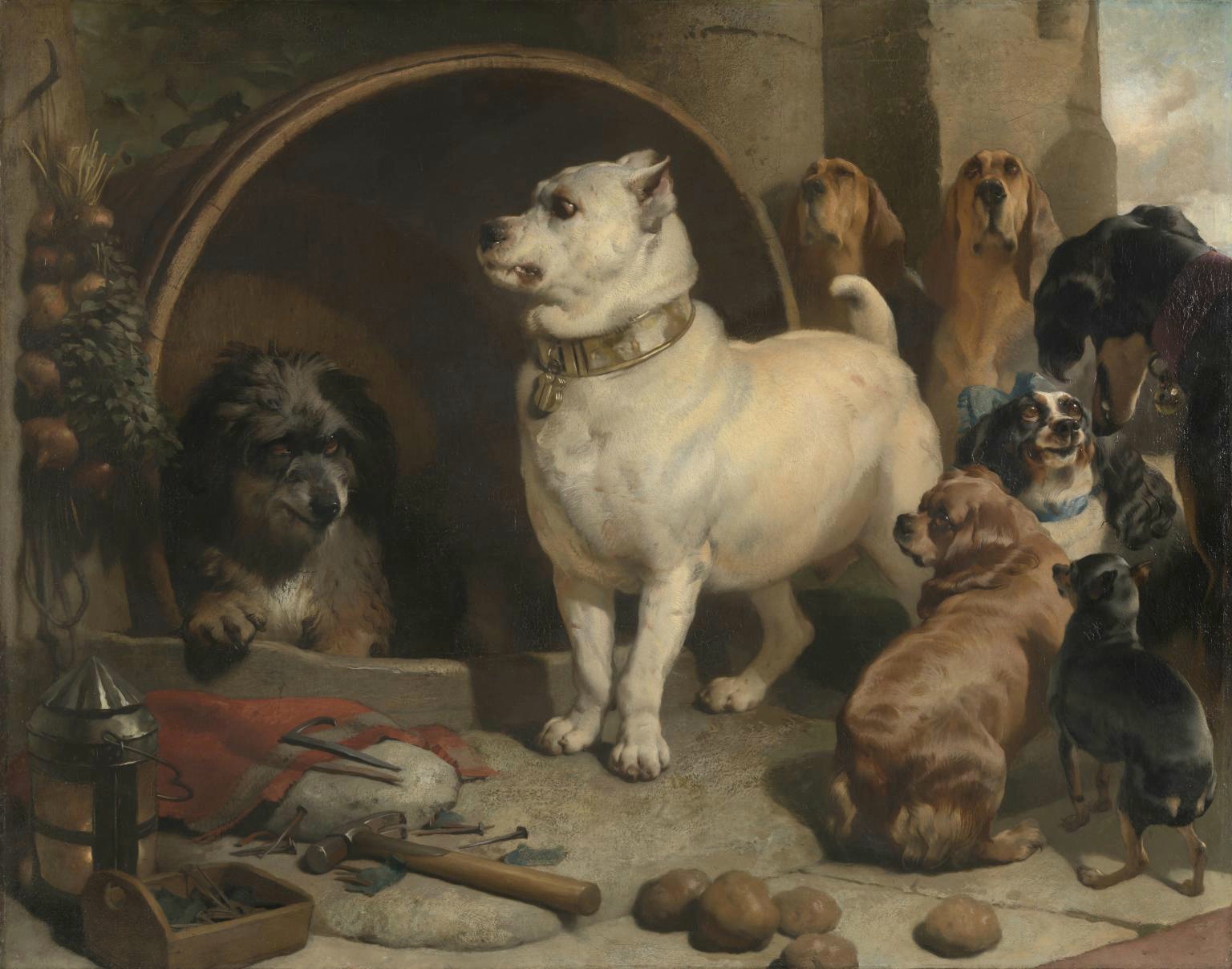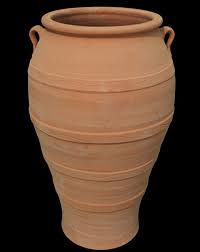
The picture above shows Edwin Landseer’s wonderful take on the meeting between the Cynic philosopher Diogenes and Alexander the Great. The Greek word ‘kynikos’, from which the philosophy Cynicism took its name, means ‘dog-like.’ Diogenes is the scruffy dog in the ‘kennel’ on the left. Alexander is of course the grand white dog. The posh dogs on the right represent his courtiers.
GRAND WHITE DOG: Anything you like, Scruffy Dog, anything at all. I’ll do it for you.
SCRUFFY DOG: In that case, stand out of my light.
This dialogue is by me, not Landseer, and is based on an anecdote told by the writer Diogenes Laertius. (Lives of the Philosophers 6.38)
The Greek word ‘kynikos’, from which Cynicism took its name, means ‘dog-like.’

Photo courtesy of Sabine Grauel-Baumann

A ‘guard’ dog, Henri Gaudier-Brzeska, 1914. Cast in aluminium in 1966. Kettle’s Yard, Cambridge
THERE ARE A NUMBER OF REASONS why the nickname ‘Dog-like’ or ‘Doggy’ may have been attached to the philosophers we call the Cynics. Perhaps it was because they despised social conventions, and insisted on doing in public many of the things which we ourselves are pretty keen to keep private. According to the Cynics all human bodily functions are natural, and nothing to be ashamed of. So why not perform them in full view of our fellow citizens? They put their beliefs into practice and like the dogs we know and love, used to pee, defecate, masturbate and fornicate on the street or in the theatre or market-place.
They may also have been called ‘Doggy’ because they saw themselves, like dogs, as guard animals, keeping a watchful eye on public morals and behaviour.

The significance of the ancient Greek word ‘kynikos’ when used to describe a group of philosophers is not unlike the meaning we ascribe to the term ‘cynical’ today. My friend Andrew Wyllie has defined it as follows:
Cynical: possessing a disposition to distrust the motives which underlie actions taken or propounded in an apparently disinterested/unselfish spirit.
Example of a cynical response: ‘They’re only feathering their own nests.’
At its worst, cynicism justifies (in the mind of the cynic) selfishness and inaction, especially in the public-interest sphere.
The Collins dictionary defines it as ‘distrustful or contemptuous of virtue, especially selflessness in others’. The Cynics, as we shall see, did indeed believe that it was difficult to find any genuine demonstrations of virtue in ancient Greece.
Dictionary.com gives us two definitions:
Diogenes and the origins of Cynicism
Scruffy Dog’s ‘kennel’ in Landseer’s painting looks like a large broken pot. Many European artists and writers place him in barrel, which is less accurate but not too wide of the mark. When Diogenes, the founder of the Cynics, was about to move to Athens from Sinope on the Black Sea, he wrote to a friend in the city asking him to find a place for him to live. But the friend took his time, so on his arrival Diogenes set up home near the agora in a large clay jar – a pithos – once used for storing wine. He remained there for the rest of his time in Athens (Diogenes Laertius 6.23).


Here, Diogenes has set up home in a barrel. ‘Alexandre et Diogène’, 1500s. Urbino majolica, Musée des Beaux Arts, Lyon
Both Jean-Léon Gérôme (1860) and J.W. Waterhouse (1882) get it right – in their paintings Diogenes is living in a pithos, not a barrel. In the Waterhouse version, a curious young woman peers at the philosopher over the balustrade, and plays the part of Alexander, casting her shadow over him.



Poussin’s magnificent painting of Diogenes meeting a boy drinking from his hands (1647): the figures are dwarfed by the natural world, very appropriate for a philosopher who believed that in their actions humans should be guided by nature.
In Athens Diogenes became familiar with the ideas of Antisthenes, a disciple of Socrates who advocated an ascetic way of life. Embracing self-denial with great gusto, Diogenes threw away almost everything he owned, and began to live as a beggar. A well-known story relates how he saw a boy one day drinking out of his hands from a pool, and immediately took his cup from his knapsack and smashed it. “In the pursuit of plain living,” he commented, “I’ve been outclassed by a child.” (Diogenes Laertius 6.2.37). A hard life, he believed, enables us to anticipate the worst that fate can inflict on us; and he forswore not just luxuries, but civilised life in general, satisfying his needs in the most basic way possible.
What is acquired with so much effort is preserved with even greater anxiety: safeguarding huge wealth is a distressing business. Remember, the jar which naked Cynics sleep in never catches fire; and if it breaks, there’ll be another one tomorrow. … Alexander understood this when he visited the eminent man in his earthenware home: he saw how much happier the great philosopher was, because he had no desires.
Juvenal, Satires 14.303 ff
I admire Diogenes’ principles and way of life, though I can see that he must have been an irritating man if you had to live alongside him. Both he and Socrates can come over as rather self-satisfied and disingenuous. But Socrates had at least contented himself with cross-questioning everyone he bumped into in Athens about the nature of virtue. Diogenes could be downright rude. When he was asked for his own opinion on why he was called the Dog, he replied, ‘Because I slaver over people who give me something, bark at people who don’t give me a sou, and bite people who are rogues.’
Dost thou think, because thou art virtuous, there shall be no more cakes and ale?
(Shakespeare, Twelfth Night, Act 2, Scene 3)
Goya, A beggar with a dog, 1801-25

Yet Diogenes depended on begging for his livelihood. He was obviously quite proud of it, too. When an acquaintance enquired what wine he enjoyed the most, his answer was, ‘The wine that other people pay for’. It was never Diogenes’ round, we can safely assume.
Diogenes’ ostentatious poverty might be referred to today as ‘virtue-signalling’. It’s something I am prone to myself. For instance, if I’m going to Europe on holiday, I do like my friends to know that I’m travelling by train, not flying. But how can people be persuaded to reduce their carbon-consumption if they’re not made aware of the viable alternatives? That’s my excuse, anyway, and Diogenes might well have offered a similar justification. Although he would probably have travelled on foot.


Raphael’s ‘School of Athens’ in the Stanza della Segnatura, The Vatican, Rome. The figure in blue sprawling on the steps in front of the central figures of Plato and Aristotle, standing at the back, has been identified as Diogenes. He is conspicuous in his state of relative undress and his shoelessness.

‘Why do you do go around with a lamp in broad daylight?’ puzzled onlookers reportedly asked Diogenes. ‘I’m looking for an honest man,’ he retorted. This is the reason why both Gérôme and Waterhouse include a lamp in their pictures. Diogenes was a cynic in the modern sense, I think: he believed that the society he was living in was corrupt and hypocritical, and didn’t want any part of it.
But this didn’t stop him from protesting in a material and eye-catching way. Diogenes was also ‘cynical’ in the terms of Dictionary.com’s second definition. He was interested in his own actions as well as those of other people, and in his behaviour constantly challenged the scruples of his fellow-citizens.
Diogenes was a showman. This shouldn’t prevent us from taking him seriously, however. When a young man grumbled that he wasn’t really suited to the study of philosophy, Diogenes’ exasperated response shows genuine zeal.
‘Why do you carry on living if you’re not interested in living well?’

